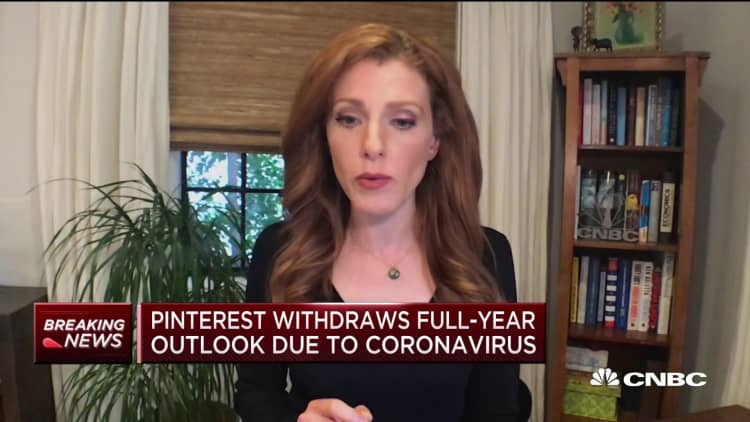As the coronavirus crisis continues to escalate, doctors, scientists and medical professionals have been pushed to their limits in pursuit of PPE (personal protective equipment) and various medical devices, such as ventilators, to combat the virus and its mortality rate. Another device they're in desperate need of in this fight? Information.
To solve for the lack of information available to these public health professionals, Pinterest CEO Ben Silbermann has partnered with leading doctors and scientists to launch a new app called "How We Feel", which allows Americans to self-report just that — how they're feeling, healthy or not.
The app, created by The How We Feel Project, lets people in the U.S. report their age, gender, Zip code and most importantly, any health symptoms they may be experiencing, helping researchers reveal outbreak hot spots and track the ongoing spread of the virus.
The How We Feel Project is part of a nonprofit collaboration between Silbermann and an interdisciplinary group of researchers affiliated with institutions like Harvard, MIT, University of Pennsylvania, Stanford University and Weill Cornell Medicine, among others, as well as a volunteer team of current and former Pinterest employees. The mobile app is the organization's first product.
Disclosing data amid COVID-19 outbreak
A new Axios report indicates that Americans are largely split when it comes to giving up data to fight coronavirus. According to the report, some 54% of Americans said they'd be comfortable sharing health status data in the interest of monitoring public health. These findings are from Oliver Wyman Forum, a research firm that surveyed 1,000 Americans and over 500 people each in the U.K., Germany, Spain, Australia and Singapore, balanced by age and gender, from March 21-27.
A White House task force has been working with major tech companies including Alphabet's Google and Facebook on health information efforts related to the coronavirus. Facebook has been developing tools to help track the spread of the virus.
In an email to CNBC, a Pinterest spokesperson said that it's critical for Americans to participate and that they need "as many people as possible to donate their data," adding that the app is completely independent from Pinterest and that people's data will not be sold to any company or used by Pinterest.
The app requires that users monitor their health and check-in daily, which the organization claims takes less than 30 seconds. Additionally, the app does not require logging in or the sharing of details such as names or email addresses.
The Oliver Wyman Forum survey found that just 21% of survey respondents would want a positive result shared with an app that discloses where people are infected through anonymized or aggregated data, while 9% would share it with an app that discloses the names of people infected.
Silbermann partnered closely with Feng Zhang, best known for pioneering the revolutionary gene-editing technology CRISPR. Zhang is also a core institute member at the Broad Institute of MIT and Harvard, and an investigator with the Howard Hughes Medical Institute and the McGovern Institute for Brain Research at MIT, all of which are involved in the work being done by "How We Feel."
Zhang and Silbermann, lifelong friends, say they formed the new nonprofit to determine how best their respective fields — biology and technology — could come together to solve for the lack of reliable health data from testing.
"Since high school ... Zhang and I have been talking about the enormous value of connecting citizens to the global health and research community," Silbermann said in a press release. "When we saw how quickly COVID-19 was spreading, it felt like a critical moment to finally build that bridge between citizens and scientists that we've always wanted."
As the two continue working together, Zhang is also organizing an international consortium of researchers from 11 countries that have developed similar health status surveys. The consortium is called the Coronavirus Census Collective (CCC).
"COVID-19 is a global problem without boundaries, and we need a global response," said Eran Segal, a computational biologist and professor at the Weizmann Institute who co-founded the CCC with Zhang. "The Coronavirus Census Collective was formed to leverage the efforts of researchers from around the world that are working to collect health information from individuals. By pooling this data, we can learn even more about how to fight COVID-19."
For each download of the app and first completed health check-in, Silbermann and his wife, Divya Silbermann, will donate a meal to a family in need through Feeding America. The couple has pledged to donate up to 10 million meals. "It was an easy choice for us to pick Feeding America because they've worked with local food banks for more than 35 years. They know how to get help to the people who need it most right now," said Divya Silbermann in the release.

Despite weakness across the advertising industry throughout the outbreak's acceleration, Pinterest's exposure to some of the most affected segments of the economy has been minimal. Shares of Pinterest rallied after the company issued early guidance on Tuesday night for its fiscal first quarter. The company said it expects revenue in the range of $269 million to $272 million, compared to analysts' pre-coronavirus expectations of $267 million.
"In light of the rapidly evolving and unpredictable effects of COVID-19, Pinterest is currently not in a position to forecast the expected impact of COVID-19 on its financial and operating results for the remainder of 2020. As the COVID-19 pandemic has continued to unfold, it has impacted Pinterest's advertising revenue globally," the company said in its earnings release.






